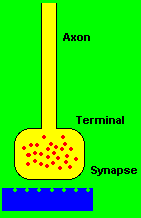C10H12N2O

FUNCTIONS OF SEROTONIN
There are several reasons serotonin exists in our body.
This animation shows how neurotransmitters work.
The yellow portion is all part of the neuron from which the neurotransmitter (in this case, serotonin) comes from. The part where neurotransmitters are fused out from this first neuron is known as the "pre-synaptic neuron".
The red dots are the abundant neurotransmitters that come from the neuron and bind to the receptors in order to perform their specific function.
The blue portion is the receiving end of the next neuron. The indentations are the receptors onto which the neurotransmitters will bind. The neuron which receives the neurotransmitters and has receptors that these neurotransmitters bind to is known as the "post-synaptic neuron".
NEUROTRANSMITTERS
Serotonin is a neurotransmitter, but how does it work?

The neurtransmitters are stored in a transport vesicle and are brought down by a type of enery known as action potential. Because action potential cannot be passed through the synaptic space (that negative green space between the pre and post synaptic neuron), the neurotransmitters are released from the vesicles through a membrane-assisted transport process known as "exocytosis".
After the neurotransmitter has sent its message through the receptors, they return to the pre-synaptic neuron through transport proteins and go back into vesicles, waiting for the next action potential to occur.
SPECIFIC FUNCTIONS OF SEROTONIN
The biological role of serotonin is to be an inhibitory neurotransmitter. It does not stimulate the brain and is necessary to the successful functioning of any human because proper amounts can keep the brain’s moods stable, and balance out any stimulating neurotransmitters in the brain such as dopamine (Helmly, 2013). The buildup of stimulating neurotransmitters can lead to several health and mental illnesses including schizophrenia and psychosis.
Serotonin also helps transfer messages from one part of the brain to another. Due to its broad distribution of cells (in the brain), the neurotransmitter can influence psychological and bodily functions. Approximately 40 million neurons are somehow influenced by serotonin (Feature, 2014).
Furthermore, serotonin is a neurotransmitter that is responsible for maintaining calmness and good mood and promotes happiness within an individual. It plays an important role in regulating memory, learning, blood pressure and appetites and body temperature (The Human Brain – Proteins). If too many stimulant foods or medicines are used, serotonin levels can eventually decrease significantly enough so that health problems can arise. Low serotonin levels can cause insomnia, depression, aggressive behavior, increased pain sensitivity and is known to be related to obsessive-compulsive eating disorders (The Human Brain, 2004).
Serotonin is important to the body because it performs certain vital functions that are required for our body to stay healthy (Serotonin Properties, 2014). Some of these include:
-
Sleep Regulation: Serotonin helps produce melatonin (a hormone that regulates sleep cycles), and ultimately helps us sleep.
-
Regulation of Bodily Processes: Serotonin controls the appetite, and low levels of it can cause the desire to eat, particularly carbohydrates. Low levels of serotonin can lead to eating disorders such as bulimia and obesity.
-
Regulation of Physiological Functions: Serotonin aids in several physiological functions. It is known to be a vasoconstrictor, which is good if a person is exposed to severe bleeding. In this case, the narrowing of blood vessels (vasoconstriction) can help prevent more blood loss. Serotonin also prevents the production of hydrochloric acid, and helps with gastric secretions. Hormone production and muscle stimulation (especially in the digestive tract) as well as the process of mitosis in various cells are also processes serotonin is linked to.
-
Regulation of Body Systems: Serotonin can affect the way the cardiovascular, muscular, and endocrine system function. Some researchers have identified that serotonin can help regulate breast milk production, and that defects in the complex network of serotonin molecules and transmission could be a possible cause of Sudden Infant Death Syndrome (Serotonin and Depression).
One of the more psychological functions of serotonin includes the regulation of mood. Low serotonin levels can cause anomalies in personality, depression, and other mental disorders. Without serotonin, the body would be unable to produce certain hormones that control feelings of anxiety, confidence, fear, fatigue and more. It may lead to the desire to constantly be eating or sleeping.
A lack of serotonin can also lead to onset of Obsessive Compulsive Disorder (OCD), chronic fatigue syndrome, loss of interest, increased feelings of pain, violent behavior/aggressiveness, and other mental disorders and feelings.Stress, heat, a bad diet and increasing age all decrease serotonin levels, while a healthy diet, physical activity, proper sleeping habits, and an uptake of optimism can increase serotonin levels (Serotonin Properties, 2014).
